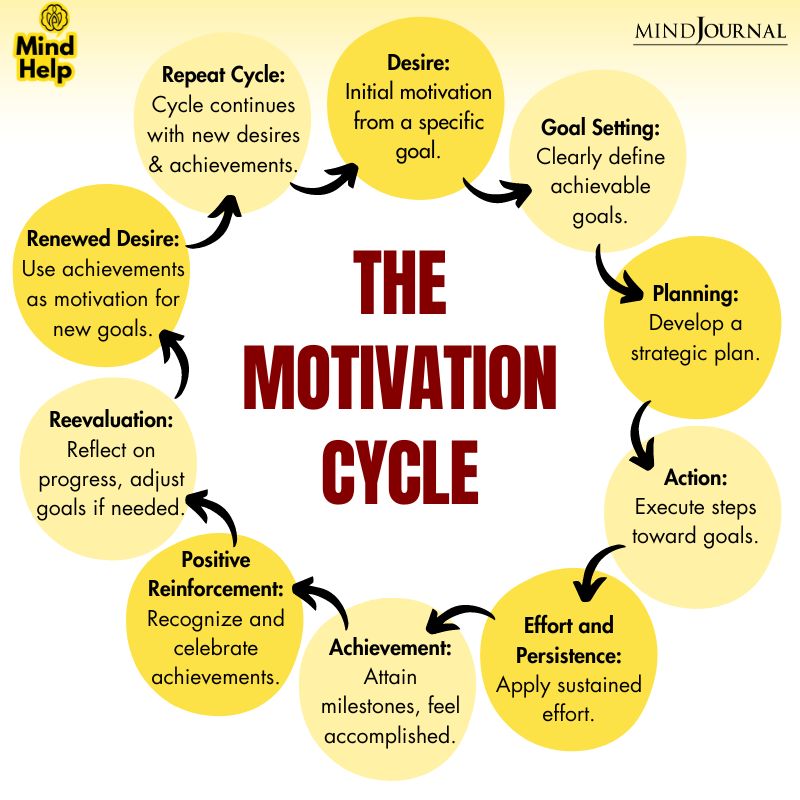What drives people to keep going when things get tough, stay focused on their goals, and find meaning in what they do? Learn about self-motivation, an essential element that is important in achieving success and leading a fulfilling life.
Cultivating techniques for self motivation help individuals foster a sense of purpose, unleash their creativity, and enhance their adaptability in different domains of life.
What is Self-Motivation?
Self-motivation is a valuable skill that enables individuals to drive themselves toward achieving their goals without any external influence.
It involves controlling the inner drive and determination that comes from an individual’s values, beliefs, interests, and past experiences of success and accomplishments. Self-motivation skills can also inspire and influence others, by drawing a strong sense of drive and purpose in their life.
Scholars and researchers in various fields, including psychology, education, and organizational behavior, have studied the concept of self-motivation over time.
Abraham Maslow 1 Liu, Z., Xiang, J., Luo, F., Hu, X., & Luo, P. (2022). The Study of Maslow’s Hierarchy of Needs Theory in the Doctor-Nurse Integration Teaching Method on Clinical Interns. Journal of healthcare engineering, 2022, 6388068. https://doi.org/10.1155/2022/6388068 , an American psychologist, proposed one of the earliest and most influential motivation theories, which highlights the innate drive individuals possess to achieve personal growth and realize their full potential through inner motivation.
The self-determination theory 2 Patrick, H., & Williams, G. C. (2012). Self-determination theory: its application to health behavior and complementarity with motivational interviewing. The international journal of behavioral nutrition and physical activity, 9, 18. https://doi.org/10.1186/1479-5868-9-18 is another crucial notion that suggests that self-motivation is heightened when individuals feel a sense of control over their actions and a connection to others who share similar goals and interests. By understanding the concept of self-motivation and developing the skills to harness it, individuals can push toward excellence, even in the face of obstacles or setbacks.
Self-Motivation Examples
Self-motivation can be cultivated by:
- Encouraging oneself with positive self-talk 3 Tod, D., Hardy, J., & Oliver, E. (2011). Effects of self-talk: a systematic review. Journal of sport & exercise psychology, 33(5), 666–687. https://doi.org/10.1123/jsep.33.5.666
- Setting specific, measurable goals
- Celebrating momentary successes 4 Hart, W., & Albarracín, D. (2009). The effects of chronic achievement motivation and achievement primes on the activation of achievement and fun goals. Journal of personality and social psychology, 97(6), 1129–1141. https://doi.org/10.1037/a0017146 along the way
- Developing a consistent routine and committing to it
- Surrounding oneself with positivity, whether it be through supportive people or uplifting content
- Incorporating physical activity 5 Brophy, S., Cooksey, R., Davies, H., Dennis, M. S., Zhou, S. M., & Siebert, S. (2013). The effect of physical activity and motivation on function in ankylosing spondylitis: a cohort study. Seminars in arthritis and rheumatism, 42(6), 619–626. https://doi.org/10.1016/j.semarthrit.2012.09.007 into one’s routine to boost energy levels and mental clarity
- Pursuing activities 6 Chen, M., Xue, S., & Shi, Y. (2018). Leisure activities and leisure motivations of Chinese residents. PloS one, 13(11), e0206740. https://doi.org/10.1371/journal.pone.0206740 that align with one’s passions and interests.
Characteristics of a Highly Self-motivated Person
Individuals who possess a high degree of self-motivation have specific traits that enable them to stay focused and achieve their objectives. Some of the essential characteristics of a highly self-motivated person:
- An optimistic attitude 7 Conversano, C., Rotondo, A., Lensi, E., Della Vista, O., Arpone, F., & Reda, M. A. (2010). Optimism and its impact on mental and physical well-being. Clinical practice and epidemiology in mental health : CP & EMH, 6, 25–29. https://doi.org/10.2174/1745017901006010025 toward life, allows them to approach challenges with resilience and hope.
- The ability to organize and manage their time and resources effectively, allowing them to prioritize tasks and remain productive.
- A persistent and determined mindset enables them to push through setbacks.
- A clear understanding of their strengths and weaknesses, allows them to leverage their strengths while addressing their weaknesses.
- A desire to continuously improve and develop themselves, taking on new challenges and learning new skills.
Why is self-motivation essential in life?

Self-motivation is essential for achieving both success and happiness in life. Here are five reasons why it matters:
1. Creates a Sense of Purpose
Self-motivation helps individuals to identify their purpose 8 Sutin, A. R., Luchetti, M., Stephan, Y., & Terracciano, A. (2022). Sense of purpose in life and motivation, barriers, and engagement in physical activity and sedentary behavior: Test of a mediational model. Journal of health psychology, 27(9), 2068–2078. https://doi.org/10.1177/13591053211021661 and goals in life, providing them with a clear direction and sense of meaning.
2. Fosters Creativity
Individuals with self-motivation are often more creative and innovative 9 Oleynick, V. C., Thrash, T. M., LeFew, M. C., Moldovan, E. G., & Kieffaber, P. D. (2014). The scientific study of inspiration in the creative process: challenges and opportunities. Frontiers in human neuroscience, 8, 436. https://doi.org/10.3389/fnhum.2014.00436 , as they are not bound by external constraints and can think outside the box.
3. Promotes Adaptability
Self-motivated individuals are better equipped to adapt to changing 10 Ybarra O. (2023). The skills that help employees adapt: Empirical validation of a four-category framework. PloS one, 18(2), e0282074. https://doi.org/10.1371/journal.pone.0282074 circumstances and overcome obstacles, as they can maintain a positive attitude and persevere through challenges.
4. Improves Relationships
Self-motivation can lead to healthier and more positive relationships 11 Okello, D. R., & Gilson, L. (2015). Exploring the influence of trust relationships on motivation in the health sector: a systematic review. Human resources for health, 13, 16. https://doi.org/10.1186/s12960-015-0007-5 with others. It helps people to become more assertive in their communication with others, leading to better understanding and more effective communication, which can help build stronger relationships.
5. Encourages Risk-taking
Self-motivation can empower individuals to take calculated risks 12 Li, M., Lauharatanahirun, N., Steinberg, L., King-Casas, B., Kim-Spoon, J., & Deater-Deckard, K. (2019). Longitudinal link between trait motivation and risk-taking behaviors via neural risk processing. Developmental cognitive neuroscience, 40, 100725. https://doi.org/10.1016/j.dcn.2019.100725 in pursuit of personal fulfillment and growth, leading to greater confidence and a broader range of experiences.
Elements of Self-Motivation
The elements of self-motivation refer to the factors or components that contribute to an individual’s ability to motivate themselves for achieving their goals.
Here are some points explaining the different elements of self-motivation:
1. Visualization
Visualizing oneself to achieve 13 Blankert, T., & Hamstra, M. R. (2017). Imagining Success: Multiple Achievement Goals and the Effectiveness of Imagery. Basic and applied social psychology, 39(1), 60–67. https://doi.org/10.1080/01973533.2016.1255947 the desired outcome can help in building motivation, confidence, and focus.
2. Self-reflection
Reflecting on one’s experiences 14 Pillny, M., Krkovic, K., Buck, L., & Lincoln, T. M. (2022). From Memories of Past Experiences to Present Motivation? A Meta-analysis on the Association Between Episodic Memory and Negative Symptoms in People With Psychosis. Schizophrenia bulletin, 48(2), 307–324. https://doi.org/10.1093/schbul/sbab120 , strengths, weaknesses, and progress helps in identifying areas of improvement, setting new goals, and staying motivated.
3. Self-belief
Believing in one’s abilities, skills, and potential helps in overcoming obstacles, taking risks 15 Bayat, B., Akbarisomar, N., Tori, N. A., & Salehiniya, H. (2019). The relation between self-confidence and risk-taking among the students. Journal of education and health promotion, 8, 27. https://doi.org/10.4103/jehp.jehp_174_18 , and pursuing challenging goals is considered to be one of the crucial factors of self-motivation.
4. Self-discipline
Developing self-discipline 16 Claver, F., Martínez-Aranda, L. M., Conejero, M., & Gil-Arias, A. (2020). Motivation, Discipline, and Academic Performance in Physical Education: A Holistic Approach From Achievement Goal and Self-Determination Theories. Frontiers in psychology, 11, 1808. https://doi.org/10.3389/fpsyg.2020.01808 and self-control helps in avoiding distractions, staying focused, and following through with commitments.
5. Persistence
Persisting towards one’s goals 17 Moyers, T. B., & Rollnick, S. (2002). A motivational interviewing perspective on resistance in psychotherapy. Journal of clinical psychology, 58(2), 185–193. https://doi.org/10.1002/jclp.1142 , despite setbacks and obstacles, and learning from failures helps to develop self-motivation.
Types of Motivators

Understanding different types of motivators can help individuals to identify their source motivation and create strategies to sustain it for achieving goals. Here are the two most common types of motivators:
1. Intrinsic Motivators
Intrinsic motivators refer to the internal drive 18 Di Domenico, S. I., & Ryan, R. M. (2017). The Emerging Neuroscience of Intrinsic Motivation: A New Frontier in Self-Determination Research. Frontiers in human neuroscience, 11, 145. https://doi.org/10.3389/fnhum.2017.00145 or desire that comes from within an individual to perform a certain behavior or activity. Intrinsic motivators can be very powerful and long-lasting.
Examples include the desire for personal growth, the sense of accomplishment, and the satisfaction to do a job well.
2. Extrinsic Motivators
This refers to external factors 19 Ramirez-Andreotta, M. D., Tapper, A., Clough, D., Carrera, J. S., & Sandhaus, S. (2019). Understanding the Intrinsic and Extrinsic Motivations Associated with Community Gardening to Improve Environmental Public Health Prevention and Intervention. International journal of environmental research and public health, 16(3), 494. https://doi.org/10.3390/ijerph16030494 that drive individuals to perform a certain behavior or activity. These motivators are usually tied to rewards or recognition from outside the individual.
Examples include money, promotions, awards, public recognition, etc.
Self-motivation and Mental Health
Self-motivation can have both positive and negative effects on our mental health, depending on how it is experienced and expressed. Here are some examples:
Positive Effects
1. Sense of Control
When people are self-motivated, they feel a greater sense of control 20 Yahya J. (2021). Breaking Beyond the Borders of the Brain: Self-Control as a Situated Ability. Frontiers in psychology, 12, 617434. https://doi.org/10.3389/fpsyg.2021.617434 over their lives. This can help reduce feelings of anxiety and stress, as individuals feel empowered to take action and make positive changes.
2. Resilience
Self-motivation can help us build greater resilience 21 Whitfield, K. M., & Wilby, K. J. (2021). Developing Grit, Motivation, and Resilience: To Give Up on Giving In. Pharmacy (Basel, Switzerland), 9(2), 109. https://doi.org/10.3390/pharmacy9020109 and cope with challenges more effectively. When people are motivated, they are better able to bounce back from setbacks and stay focused on their goals, even in the face of adversity.
Read More About Resilience Here
3. Better Mental Health Outcomes
Studies have shown that self-motivation is linked to better mental health 22 Sheehan, R. B., Herring, M. P., & Campbell, M. J. (2018). Associations Between Motivation and Mental Health in Sport: A Test of the Hierarchical Model of Intrinsic and Extrinsic Motivation. Frontiers in psychology, 9, 707. https://doi.org/10.3389/fpsyg.2018.00707 outcomes, including lower rates of depression and anxiety.
Negative Effects
1. Pressure and Stress
When people are over-motivated, they may put too much pressure 23 Yang, M., Viladrich, C., & Cruz, J. (2022). Examining the relationship between academic stress and motivation toward physical education within a semester: A two-wave study with Chinese secondary school students. Frontiers in psychology, 13, 965690. https://doi.org/10.3389/fpsyg.2022.965690 on themselves to achieve their goals. This can lead to negative mental health outcomes, such as feelings of stress and burnout.
Read More About Stress Here
2. Obsession and Addiction
When self-motivation turns into an obsession, an individual may become overly occupied with a particular goal or behavior. Some individuals may exhibit addictive-like behaviors 24 Koob, G. F., & Volkow, N. D. (2016). Neurobiology of addiction: a neurocircuitry analysis. The lancet. Psychiatry, 3(8), 760–773. https://doi.org/10.1016/S2215-0366(16)00104-8 such as working excessively long hours, neglecting their personal lives and relationships, or engaging in risky or unhealthy behaviors to maintain their productivity.
Read More About Addiction Here
3. Perfectionism
Self-motivation can sometimes lead to perfectionism, where individuals set impossibly high standards 25 Vicent, M., Sanmartín, R., Vásconez-Rubio, O., & García-Fernández, J. M. (2020). Perfectionism Profiles and Motivation to Exercise Based on Self-Determination Theory. International journal of environmental research and public health, 17(9), 3206. https://doi.org/10.3390/ijerph17093206 for themselves and are never satisfied with their achievements. This can lead to a negative impact on mental health such as feelings of frustration and stress.
Read More About Perfectionism Here
Effects of Lack of Self-motivation
Maintaining motivation and enthusiasm to achieve one’s objectives in challenging situations can be difficult. Lack of self-motivation can have a significant impact on an individual’s life, impeding one’s ability to reach their targets, pursue interests, and lead fulfilling lives.
A lack of self-motivation can lead to:
1. Procrastination
Without self-motivation, individuals may be more likely to put off important tasks or avoid taking action 26 Beutel, M. E., Klein, E. M., Aufenanger, S., Brähler, E., Dreier, M., Müller, K. W., Quiring, O., Reinecke, L., Schmutzer, G., Stark, B., & Wölfling, K. (2016). Procrastination, Distress and Life Satisfaction across the Age Range – A German Representative Community Study. PloS one, 11(2), e0148054. https://doi.org/10.1371/journal.pone.0148054 altogether. This can lead to a sense of overwhelm and a cycle of inactivity.
Read More About Procrastination Here
2. Low Productivity
Without self-motivation, staying focused and productive can become a real challenge. People may find themselves procrastinating, struggling to follow through, or taking much longer to complete tasks. Over time, this can impact both their work performance and progress toward personal goals 27 Lohela-Karlsson, M., Jensen, I., & Björklund, C. (2022). Do Attitudes towards Work or Work Motivation Affect Productivity Loss among Academic Employees?. International journal of environmental research and public health, 19(2), 934. https://doi.org/10.3390/ijerph19020934 or personal goals.
3. Lack of Achievement
When individuals lack self-motivation, they may find it challenging to achieve 28 Hart, W., & Albarracín, D. (2009). The effects of chronic achievement motivation and achievement primes on the activation of achievement and fun goals. Journal of personality and social psychology, 97(6), 1129–1141. https://doi.org/10.1037/a0017146 their goals or pursue their passions, leading to a sense of frustration or regret.
4. Poor Self-esteem
A lack of self-motivation can also affect one’s self-esteem 29 van der Kaap-Deeder, J., Wouters, S., Verschueren, K., Briers, V., Deeren, B., & Vansteenkiste, M. (2016). The Pursuit of Self-Esteem and Its Motivational Implications. Psychologica Belgica, 56(2), 143–168. https://doi.org/10.5334/pb.277 and confidence. People may feel like they’re not living up to their potential or that they’re not capable of achieving their goals. This can lead to self-doubt and low self-worth.
Read More About Self-Esteem Here
5. Decreased Happiness
Ultimately, a lack of self-motivation can impact an individual’s overall happiness 30 Esch T. (2022). The ABC Model of Happiness-Neurobiological Aspects of Motivation and Positive Mood, and Their Dynamic Changes through Practice, the Course of Life. Biology, 11(6), 843. https://doi.org/10.3390/biology11060843 and sense of fulfillment. Without the drive and passion to pursue their goals and dreams, they may feel unfulfilled or unsatisfied with their lives.
How to Increase Self-motivation

Here are six best tips for self-motivation that can help an individual to get started:
1. Set Specific Goals
Clear and concise goals can help you focus and stay motivated 31 Fang, H., He, B., Fu, H., Zhang, H., Mo, Z., & Meng, L. (2018). A Surprising Source of Self-Motivation: Prior Competence Frustration Strengthens One’s Motivation to Win in Another Competence-Supportive Activity. Frontiers in human neuroscience, 12, 314. https://doi.org/10.3389/fnhum.2018.00314 . Break down larger goals into smaller, achievable steps to keep yourself on track.
2. Establish a Routine
A consistent routine can help you develop positive habits 32 van der Weiden, A., Benjamins, J., Gillebaart, M., Ybema, J. F., & de Ridder, D. (2020). How to Form Good Habits? A Longitudinal Field Study on the Role of Self-Control in Habit Formation. Frontiers in psychology, 11, 560. https://doi.org/10.3389/fpsyg.2020.00560 and increase productivity. Whether it’s a morning routine to kick-start your day or a set schedule for work or exercise, find a routine that works for you.
3. Identify Your Why
Understanding the reasons behind your goals 33 Manton, K. J., Gauld, C. S., White, K. M., Griffin, P. M., & Elliott, S. L. (2019). Qualitative study investigating the underlying motivations of healthy participants in phase I clinical trials. BMJ open, 9(1), e024224. https://doi.org/10.1136/bmjopen-2018-024224 and aspirations can provide a powerful source of motivation. Connect with your values and motivations regularly to stay inspired.
4. Focus on Progress, Not Perfection
Perfectionism can lead to feelings of self-doubt and procrastination. Instead, focus on incremental progress 34 Höchli, B., Brügger, A., & Messner, C. (2018). How Focusing on Superordinate Goals Motivates Broad, Long-Term Goal Pursuit: A Theoretical Perspective. Frontiers in psychology, 9, 1879. https://doi.org/10.3389/fpsyg.2018.01879 and celebrate small victories along the way.
5. Reward Yourself
Celebrate your achievements, no matter how small. Rewards 35 Liu, Y., Yang, Y., Bai, X., Chen, Y., & Mo, L. (2022). Do Immediate External Rewards Really Enhance Intrinsic Motivation?. Frontiers in psychology, 13, 853879. https://doi.org/10.3389/fpsyg.2022.853879 can motivate you to continue making progress toward your goals.
6. Surround Yourself with Positivity
Surrounding yourself with positive people 36 Horowitz L. G. (1985). The self-care motivation model: theory and practice in healthy human development. The Journal of school health, 55(2), 57–61. https://doi.org/10.1111/j.1746-1561.1985.tb04079.x , messages, and environments can increase your mood and motivation. Seek out supportive friends and family members, read inspiring books or articles or create a workspace that inspires you.
Takeaway
Self-motivation nearly affects every facet of our lives. Therefore, maintaining realistic goals, practicing self-care, and focusing on positive outcomes are of utmost need to lead a fulfilling life.
At A Glance
- Self-motivation is a key factor in achieving success and fulfillment in all areas of our lives.
- Examples of self-motivation include pursuing personal goals, seeking new challenges, and finding inspiration within oneself.
- Self-motivation is important in life because it helps individuals achieve their targets, and fulfill their potential which leads to a fruitful life.
- It can positively impact our mental health, providing a sense of purpose and control, and developing strength.
- It is important to cultivate healthy self-motivation to avoid negative outcomes such as stress, burnout, and addiction.
- Some effective techniques for self-motivation include prioritizing self-care, striving for balance in all aspects of life, and setting realistic and achievable goals.
Frequently Asked Questions (FAQs)
1. How does self-motivation influence self-concept?
Self-motivation can positively influence self-concept by fostering a sense of competence, achievement, and control over one’s life.
2. Is self-motivation an attitude?
Self-motivation can be considered an attitude as it involves having a positive mindset and internal drive to achieve one’s goals.
3. Are people born with self-motivation?
While some people may have a natural inclination towards self-motivation, it is primarily a learned skill that can be developed and improved over time.
4. What is the power of self-motivation?
The power of self-motivation lies in its ability to push individuals towards achieving their goals, even in the face of obstacles and setbacks, ultimately leading to personal growth and success.
5. What causes lack of self-motivation?
Lack of self-motivation can be caused by various factors, such as fear of failure, lack of direction, low self-confidence, and lack of interest or passion in the task at hand.
6. How does self-motivation affect mental health?
Self-motivation can have a positive impact on mental health by promoting feelings of accomplishment, purpose, and self-esteem, and reducing symptoms of depression and anxiety.















